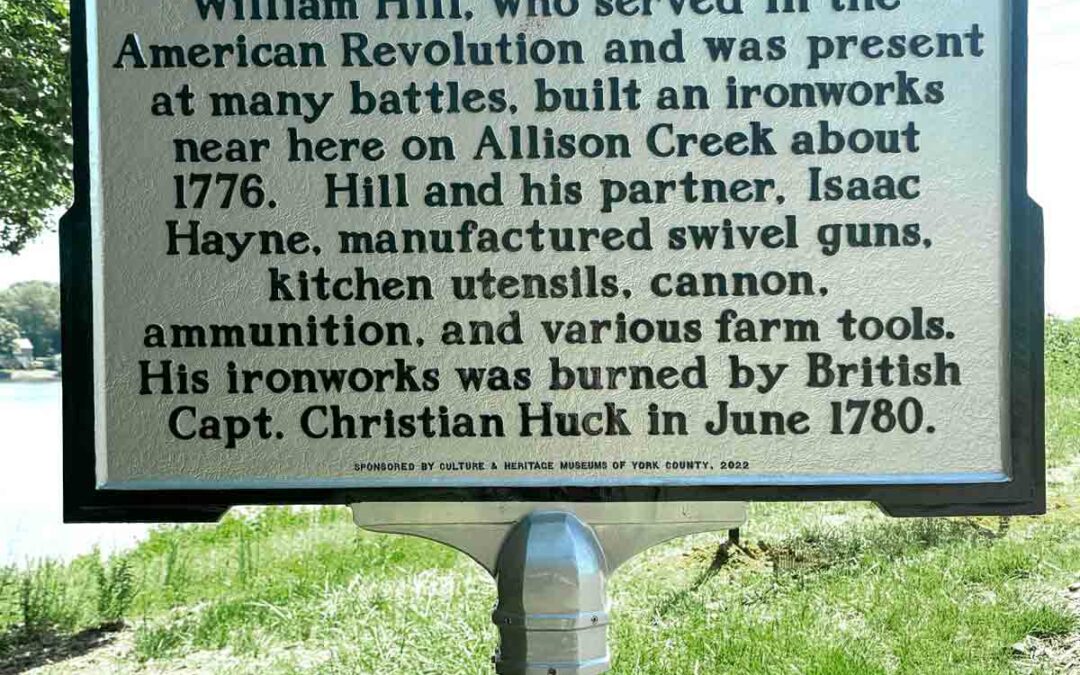FOR IMMEDIATE RELEASE
June 25, 2024
Contact:
Marie Cheek
Community Relations Coordinator
Culture & Heritage Museums of York County, S.C.
www.chmuseums.org
803.909.7312
mcheek@chmuseums.org
Re-dedication ceremony at Allison Creek Park presents a new historical marker for Hill’s Ironworks
Hill’s Ironworks, now submerged in Lake Wylie, produced tons of war materials for the Patriot cause during the American Revolution
YORK, S.C. – Culture & Heritage Museums gives Hill’s Ironworks a new historical marker installed in a new location closer to the original site. The new marker will get a re-dedication ceremony at Allison Creek Park on July 12 at 2 p.m. The original historical marker, installed in 1988 on Hands Mill Highway, is being replaced due to its last three decades of undergoing multiple repairs after being struck by vehicles on numerous occasions.
Hills’ Ironworks, built around 1776 on Allison Creek, supplied the Patriot defense in Charleston with cannons and ammunition; Hill’s also manufactured swivel guns, kitchen utensils, and various farm tools. Through the exploitation of enslaved people, as well as paid labor for white artisans, Hill’s Ironworks operated with two furnaces, a forge, two forge hammers, four grist mills, two saw mills and a two-story brick house. Iron ore was mined from nearby Nanny’s Mountain, named for William Hill’s wife, Jane “Nanny” McCall; the furnaces were fired with charcoal from the area’s vast hardwood forests. By 1780, Hill’s Ironworks was the largest operation of its type in the South Carolina Backcountry.
William Hill’s original American Revolution Era ironworks site was attacked on June 18, 1780 by Captain Christian Huck and burned to the ground. William Hill also served as an elected Lieutenant Colonel and was part of the militia that killed Huck on July 12, 1780 at what is known today as the Battle of Huck’s Defeat. The rededication ceremony takes place on the Friday before the annual reenactment of the Battle of Huck’s Defeat at Historic Bratttonsville.
In 1787, William Hill rebuilt and operated the ironworks with the exploitation of enslaved people as with the original site. The state of South Carolina gave Hill 50 enslaved people as payment for losses during the Revolution. Hill’s Ironworks continued to operate at the Allison Creek location until 1810. In 1904, the remains of the site became submerged as the water level rose when Lake Wylie was formed by the construction of Duke Power’s hydroelectric dam.
“Hill’s Ironworks was integral to Patriot resistance in South Carolina during the American Revolution. Not only did enslaved blacksmiths manufacture an estimated 106 tons of wartime material for the Patriot cause, some of which was used in the defense of Charleston, but the site became the headquarters to one of York County’s Patriot Militias. When the ironworks was destroyed by the British in June of 1780, the loss was felt across the state. Culture & Heritage Museums invites you to join us as we commemorate this historic site with a historical marker re-dedication that is free and open to the public.” — Zach Lemhouse, Historian for Culture & Heritage Museums.
WHAT: Hill’s Ironworks Historical Marker Re-dedication Ceremony
WHEN: July 12, 2024 at 2 p.m.
WHERE: Allison Creek Park – 2499 Viesta Rd, York, SC 29745
FREE TO PUBLIC: Park admission is waived for this event and shuttle service is provided
WHY: The people of York County played a significant role in the American Revolution
IMAGE: The new historical marker for Hill’s Ironworks. Credit: Culture & Heritage Museums. Contact mcheek@chmuseums.org for high resolution image.
###
